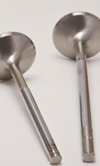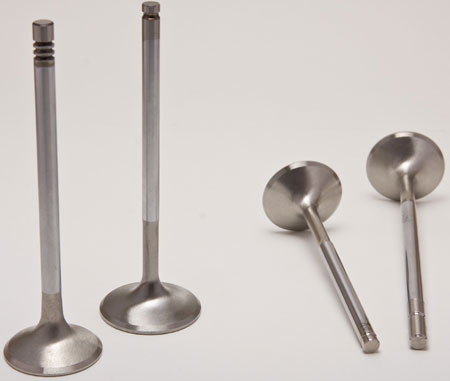Inconel
 In terms of engine development leading materials development, modern gas turbines are an excellent example. Since the days of Sir Frank Whittle, these engines have been able to progress only through parallel development of materials that are capable of operating at ever-increasing temperatures and at higher levels of stress.
In terms of engine development leading materials development, modern gas turbines are an excellent example. Since the days of Sir Frank Whittle, these engines have been able to progress only through parallel development of materials that are capable of operating at ever-increasing temperatures and at higher levels of stress.
Such high-temperature materials are not just fancy steels; in comparison even to very highly alloyed stainless steels they contain very little iron, if any at all. Internal combustion engine development has benefited from the use of such materials in a number of applications.
Inconel is a trade name that encompasses a wide range of high-temperature alloys whose major constituents are nickel and chromium. They are expensive, not only because they are very 'clean' and well controlled in terms of chemistry, but because they have a high proportion of 'strategic elements' - those that are deemed to be in short supply and of great economic and political importance. The UK government has identified a number of elements that are strategically important*, and the list includes both nickel and chromium, both of which it deems to have 'limited availability' and a potential 'risk to supply'.
The most commonly discussed use of Inconel in connection with race engines concerns its widespread and growing use in the manufacture of exhaust systems. As teams come to realise that Inconel exhaust systems can be both light and durable, they are becoming more popular, with the use of the material 'trickling down' from the highest budget series, where minimum mass is the goal, to lower-budget series, where durability is important. The most commonly used Inconel alloy for exhaust system manufacture is alloy 625.

However, there are a number of other applications for Inconel materials. They are quite widely used for highly stressed fasteners and find use as con rod bolts, particularly in alloy 718. While this application does not take advantage of Inconel's high-temperature capabilities, the tensile and fatigue properties at room temperature are impressive, and the material is much more resistant to corrosion than steel materials of equivalent strength (230 ksi/1600 MPa).
There is one use of Inconel alloys in the engine, however, that does take full advantage of the high-temperature fatigue strength of the material. Inconel 751 is used for valves where high temperatures are experienced; this alloy is especially popular for supercharged or turbocharged engines, where exhaust valve temperatures are much higher than would be the case for a naturally aspirated engine.
In a naturally aspirated race engine, the use of austenitic steels such as 21-4 is common, as is the use of titanium. However, under the harsher conditions imposed by running an engine with significantly increased mass flows and temperatures, these materials cannot operate for very long. While alloys such as Inconel 751 are denser than either austenitic steels or titanium, their use for valves is becoming increasingly necessary.
* House of Commons Science and Technology Committee Report, "Strategically important metals" (http://www.publications.parliament.uk/pa/cm201012/cmselect/cmsctech/726/726.pdf)
Fig. 1 - Inconel valves find use in supercharged and turbocharged race engines
Written by Wayne Ward